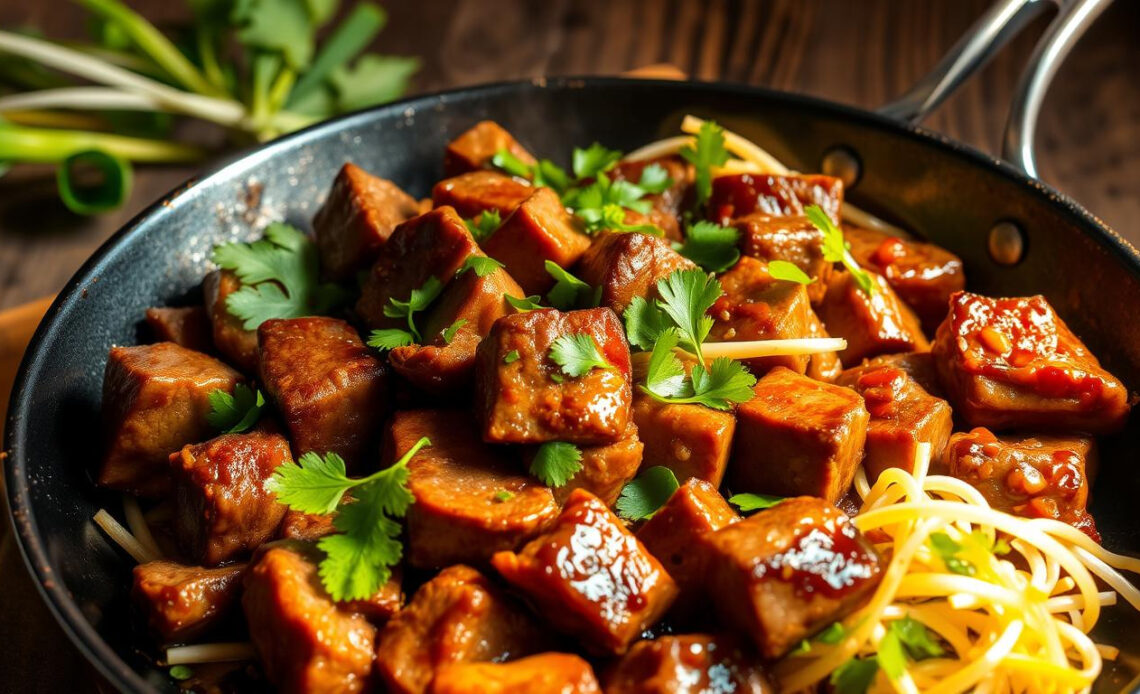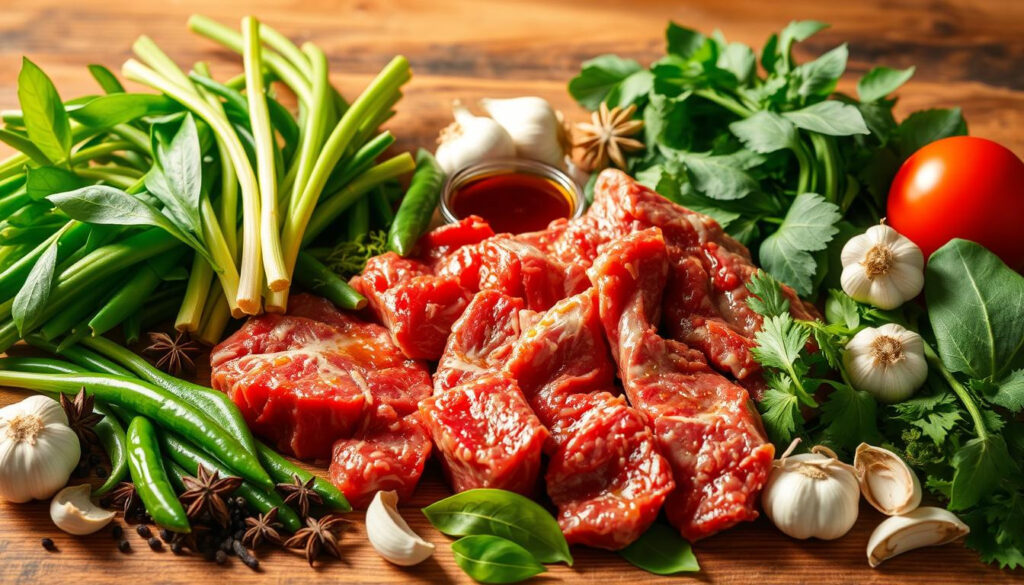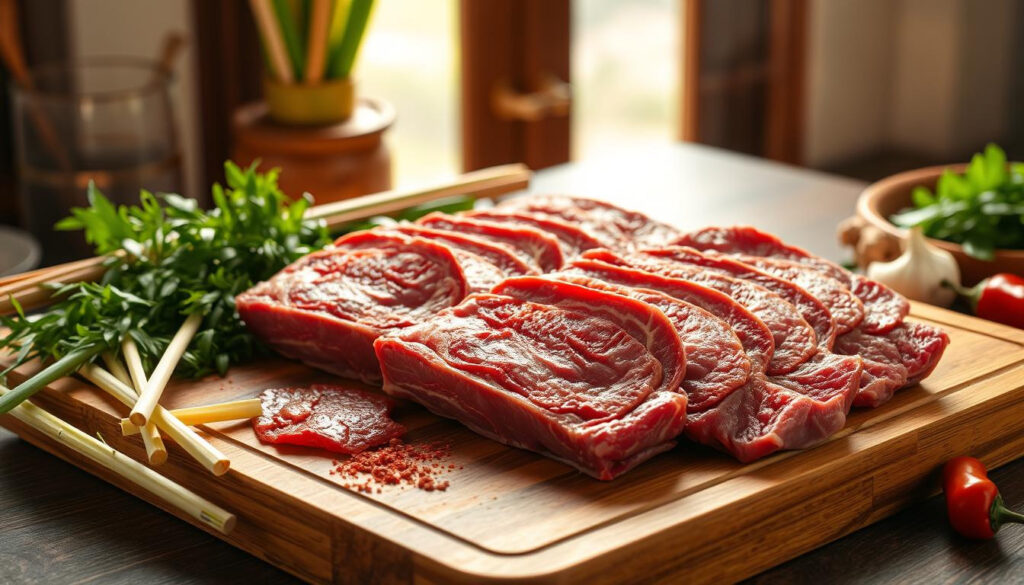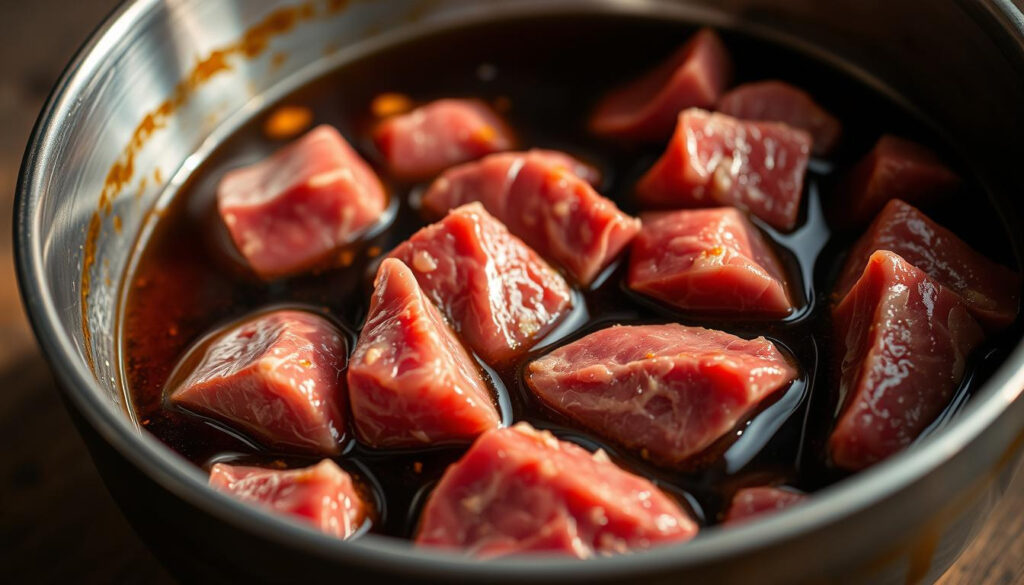
Walking through Vietnam’s lively streets, I’m greeted by the smell of sizzling beef and spices. It’s a call to try the famous shaking beef ; Shake and Beef, or bo luc lac in Vietnamese. This dish is not just food; it’s a journey into Vietnam’s rich culture and tastes.

Key Takeaways
- Discover the origins and cultural significance of the Vietnamese shaking beef dish
- Explore the essential ingredients and step-by-step cooking instructions for authentic bo luc lac
- Learn about the best meat selection, marinade techniques, and kitchen tools to achieve the perfect texture and flavor
- Uncover traditional serving suggestions, side dishes, and wine pairing recommendations
- Dive into regional variations and healthier alternatives of this beloved Vietnamese classic
Understanding Bo Luc Lac: The Story Behind Vietnamese Shaking Beef
Dive into Vietnam’s rich food history with bo luc lac, or Vietnamese shaking beef. This dish is a key part of Vietnamese cuisine. It shows the country’s vibrant culture and food evolution.
Origins of the Dish in Vietnamese Cuisine
Bo luc lac started during Vietnam’s French colonial era. It mixed Vietnamese and French cooking styles. This blend created a dish that’s loved today.
Why It’s Called “Shaking” Beef
The name “shaking beef” comes from how it’s cooked. Beef cubes are quickly seared in a hot pan. The cook shakes the pan to cook the beef evenly.
This method gives the meat a great texture. It also mixes the flavors well.
Cultural Significance in Modern Vietnamese Dining
Today, bo luc lac is a celebrated dish in Vietnam. It’s found in family restaurants and fancy places. It’s also loved worldwide, showing the beauty of Vietnamese cuisine.
“Bo luc lac is not just a dish, but a culinary masterpiece that encapsulates the rich tapestry of Vietnamese food culture.”
Essential Ingredients for Authentic Shake and Beef
Making the perfect Vietnamese beef recipe, “Shake and Beef” (or Bo Luc Lac), needs top-notch ingredients. You’ll need tender beef, fresh veggies, and a special sauce. Each part is key to getting the real taste of this favorite dish. Let’s look at the shake and beef ingredients that will take you to Vietnam’s lively streets.
The Beef
The beef is the main attraction. It should be soft, flavorful, and of the best quality. The top choices are:
- Filet mignon (tenderloin)
- Sirloin
- Flank steak
These cuts are loved for their texture and taste. They match well with the other parts of the Vietnamese beef recipe.
Aromatics and Vegetables
The dish also needs crunchy, aromatic veggies to go with the beef. You’ll need:
- Onions
- Garlic
- Scallions (green onions)
- Tomatoes
- Lettuce or watercress
These add depth, balance, and a cool contrast to the dish’s flavor.
Sauce Components
The sauce is the heart of the Vietnamese beef recipe. It’s a mix of sweet, sour, and savory. The main parts are:
- Fish sauce
- Soy sauce
- Brown sugar
- Lime juice
- Black pepper
Together, they make a sauce that’s both captivating and complete. It coats the beef and veggies perfectly.
With these shake and beef ingredients, you’re ready to make a real and tasty Vietnamese beef recipe. It will impress your taste buds and take you to the heart of Vietnamese food.
Kitchen Tools and Equipment You’ll Need
To make the perfect Vietnamese shaking beef, you need the right tools. A good wok and temperature control tools are key. They help get the right texture and flavor.
Wok vs. Traditional Pan Options
A traditional skillet works, but a wok is best for stir-frying. Its shape and heat capacity make cooking even and quick. This is important for the “shaking” technique. If you don’t have a wok, a heavy-duty, non-stick pan with sloped sides will do.
Temperature Control Essentials
Getting the shaking beef just right needs precise temperature control. You’ll need a cooking thermometer to check oil and meat temperatures. This ensures the beef is seared right without getting overcooked.
Preparation Tools Checklist
- Sharp chef’s knife for slicing the beef
- Cutting board
- Measuring cups and spoons
- Mixing bowls for marinating the beef
- Tongs or chopsticks for “shaking” the beef in the wok
- Spatula for stirring and serving
With the right cooking tools for shaking beef and practice, you’ll master Vietnamese shaking beef. Next, we’ll look at choosing and preparing the meat for a delicious dish.
Meat Selection and Preparation Tips
Creating an authentic Vietnamese shaking beef dish starts with the right meat. You need to choose the best beef cuts for shaking beef and know how to prepare the meat for stir-fry.
Selecting the Best Beef Cuts
The best beef for shaking beef is tender, flavorful, and can handle high heat. Look for:
- Filet mignon (tenderloin)
- Sirloin tip (knuckle)
- Top sirloin
- Flank steak
These cuts are tender and juicy. They make your shaking beef dish delicious.
Preparing the Meat
Before cooking, prepare the meat this way:
- Trim off any extra fat or connective tissue.
- Cut the beef into thin, 1-inch cubes or slices, about 1/4 inch thick.
- Tenderize the meat by pounding it lightly with a meat mallet or the back of a knife.
- Pat the beef dry with paper towels to ensure it sears properly during cooking.
By carefully selecting and preparing the meat, you’ll make a shaking beef dish that’s both tender and flavorful.

Creating the Perfect Marinade
Making a great marinade is key to bringing out the best in your shake and beef dish. It tenderizes the meat and adds the unique taste of Vietnamese bo luc lac sauce.
Traditional Marinade Components
The classic marinade for marinade for shaking beef mixes soy sauce, fish sauce, brown sugar, garlic, and black pepper. These ingredients blend to create a mix of salty, sweet, and savory flavors. They perfectly match the beef’s taste.
Marination Time and Techniques
- For the best results, marinate the beef for at least 2 hours. For even more flavor, marinate it up to 24 hours.
- Make sure to toss and turn the beef often. This helps the flavors spread evenly.
- Use a resealable plastic bag or a shallow dish to marinate. This keeps the meat fully covered in the marinade.
Flavor Enhancement Methods
To enhance your marinade, try adding a few extra flavors:
- Adding a bit of rice vinegar or lime juice brightens the marinade. It adds a nice acidity.
- Thin slices of lemongrass or ginger add a fragrant, aromatic touch.
- Ground spices like cumin, coriander, or chili powder add depth and complexity.
Mastering the marinade will help you create a truly authentic and flavorful marinade for shaking beef experience.
Step-by-Step Cooking Instructions
Learning to make how to cook shaking beef is easier than you think. Just follow these simple steps for a tasty recipe for shaking beef. It will wow your family and friends.
- Start by cutting the beef into thin strips. Make sure to cut against the grain for tender meat.
- In a small bowl, mix the marinade ingredients. This includes soy sauce, rice vinegar, brown sugar, garlic, and black pepper. Add the beef strips and toss to coat well. Let it marinate for at least 30 minutes, or up to 2 hours in the fridge.
- Heat a large wok or skillet over high heat until it smokes. Add a tablespoon of oil and swirl it to coat the pan.
- Put the marinated beef in the pan in a single layer. Cook for 1-2 minutes on each side, shaking the pan often. This will sear and cook the beef to your liking.
- Take the beef out of the pan and set it aside. In the same pan, add the remaining marinade. Let it simmer for 1-2 minutes until it thickens a bit.
- Put the cooked beef back in the pan. Toss it to coat with the sauce. Serve it right away. Garnish with green onions and toasted sesame seeds if you like.
By following these easy steps, you’ll make a delicious how to cook shaking beef dish. It will quickly become a family favorite. Enjoy your recipe for shaking beef masterpiece!

Serving Suggestions and Side Dishes
Serving Vietnamese shaking beef, or “bo luc lac,” with the right sides can make your meal even better. Traditional Vietnamese dishes offer many side options. Each one is chosen to bring out the best in the shaking beef.
Traditional Accompaniments
A simple vegetable stir-fry, like sautéed morning glory, pairs well with shaking beef. The fresh greens add a nice contrast to the savory beef. A light Vietnamese salad with crunchy veggies and herbs also works great. It adds a tangy flavor that complements the beef.
Modern Plating Techniques
For a modern twist, arrange the beef on a plate with chosen sides. Try it over jasmine rice with scallions, fried shallots, and sesame seeds. This not only looks good but also tastes great.
Wine Pairing Recommendations
Choosing the right wine can enhance your meal. A dry red wine, like Cabernet Sauvignon, pairs well with the beef’s caramelized flavors. A crisp white wine, such as Sauvignon Blanc, offers a refreshing contrast.
Whether you go for traditional sides or modern plating, the key is to let the shaking beef be the main attraction. The right sides and wine will make your meal a memorable Vietnamese dining experience.
| Traditional Vietnamese Sides | Modern Plating Suggestions | Recommended Wine Pairings |
|---|---|---|
| Sautéed morning glory Vietnamese salad Jasmine rice | Jasmine rice with scallions and fried shallots Artful plating with geometric arrangements Garnishes like toasted sesame seeds | Cabernet Sauvignon Merlot Sauvignon Blanc Riesling |
Troubleshooting Common Cooking Issues
Cooking the perfect shaking beef is a delicate task. But with some tips, you can master this Vietnamese dish. We’ll help you solve problems like tough meat, uneven cooking, and sauce issues.
Tough Meat: Tenderize with Finesse
If your shaking beef is chewy, the solution is tenderization. Marinate the beef in soy sauce, rice vinegar, and baking soda for 30 minutes. This softens the meat for a better taste.
Uneven Cooking: Maximize Heat Distribution
Getting a consistent sear on shaking beef can be hard. Use a wok or large skillet and heat it up before adding meat. Don’t overcrowd the pan to avoid steaming. Cook in batches for even stir-fry troubleshooting.
Sauce Consistency: Balance Flavors
If your shaking beef sauce is too thin, thicken it with cornstarch. Mix cornstarch with water, then stir it into the sauce. Simmer until it thickens. Adjust the flavor with soy sauce, brown sugar, or fish sauce.
By tackling these common issues, you’ll make perfect shaking beef every time. Enjoy your cooking!
Healthier Variations of Shake and Beef
For those who love food but want to stay healthy, there are great options. You can make healthy shaking beef without giving up flavor. Just a few tweaks can turn the traditional dish into a low-fat Vietnamese beef delight.
Choosing leaner beef like sirloin or flank steak is a smart move. These cuts have less fat and cholesterol. Adding mushrooms to the mix can also cut down on meat while keeping the flavor rich.
For the marinade, use low-sodium soy sauce or tamari instead of regular soy sauce. Swap sugar for honey or maple syrup. This makes the dish taste better and is healthier.
- Use lean cuts of beef, such as sirloin or flank steak.
- Incorporate mushrooms to reduce the overall meat content.
- Opt for low-sodium soy sauce or tamari in the marinade.
- Replace sugar with natural sweeteners like honey or maple syrup.
Try cooking methods that use less oil, like stir-frying or steaming. This cuts down on calories and fat. It also keeps the food’s colors and flavors bright and fresh.
| Traditional Shake and Beef | Healthier Shake and Beef |
|---|---|
| High in saturated fat and calories | Lower in saturated fat and calories |
| Uses regular soy sauce and sugar | Uses low-sodium soy sauce and natural sweeteners |
| Typically fried in oil | Stir-fried or steamed with minimal oil |
With these easy changes, you can enjoy healthy shaking beef and stay on track with your diet. Try these healthier options to enjoy the real taste of low-fat Vietnamese beef without losing flavor.
Regional Variations of Shaking Beef in Vietnam
Vietnam’s vietnamese regional cuisine is known for its rich flavors and diverse dishes. The bo luc lac variations (shaking beef) is a favorite. It shows how this dish changes in different parts of the country.
In Ho Chi Minh City, the bo luc lac is made with tender beef cubes. They’re stir-fried with fish sauce, garlic, and black pepper. The dish is served on crisp lettuce leaves, letting the flavors stand out.
In Hanoi, the bo luc lac is seasoned differently. It includes lemongrass, shallots, and brown sugar. This gives it a more complex and aromatic taste.
Along the central coast, the bo luc lac features fresh seafood. In Nha Trang, it’s made with beef and shrimp. This mix of textures and flavors is delightful.
In the Mekong Delta, the bo luc lac is heartier. It’s cooked with lots of vegetables like bell peppers and onions. This makes it a more filling meal.
Despite the differences, the bo luc lac remains a beloved dish. It shows the richness of Vietnam’s food culture and its diversity.
Conclusion
The shake and beef recipe is a hit in Vietnamese cuisine. It’s loved by many around the world. Now, you can make it at home and wow your loved ones.
Whether you stick to the traditional way or try healthier options, the key is to enjoy the flavors. Follow the steps and use the right tools to make it in your kitchen.
Keep exploring different versions of shaking beef and add your own twist. The shake and beef recipe is all about being flexible. So, get ready to cook up a storm with this classic Vietnamese dish.





1 Comment